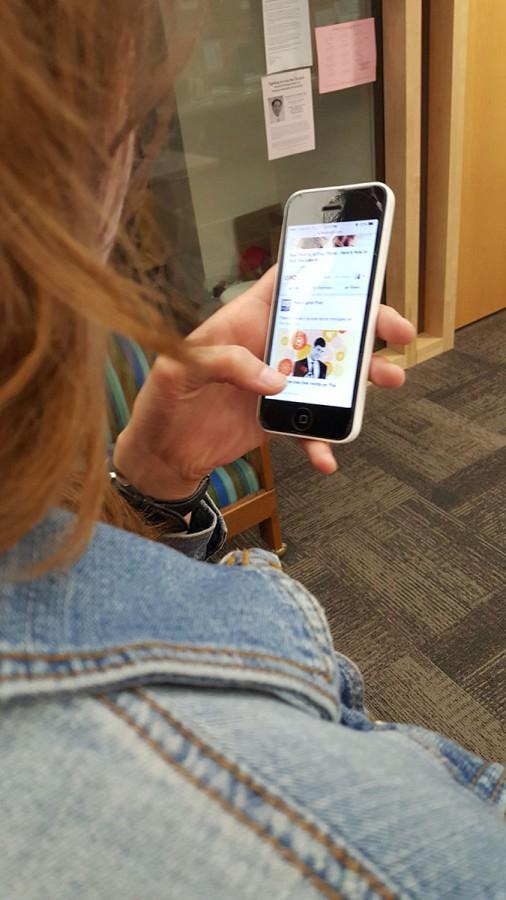Cell phones are ruining our view of the world
Life without a phone reveals some interesting yet unsettling aspects of today’s society
More stories from Thomas Hensen
Photo by Thomas Hensen
Society has grown accustomed to always checking for any social media notifications and refreshing news feeds.
Invasive, distracting and certainly unnecessary, cell phones have become such an integral part of our lives we’ve become dependent on them. I think most of us don’t even realize how little we need one until we don’t actually have one.
About a week ago I dropped my 6-month-old Samsung Galaxy S6 down a couple steps of stairs. When I picked it up, I died a little inside.
I noticed half the screen was completely black and the other half somehow worse, just showing up as a discombobulated frenzy of green pixels with the image moving up and down repeatedly. It was reminiscent of a TV searching endlessly for a signal only to be lost in despair in a sea of white and black pixelated lines.
Quite frankly, I didn’t really care I had just broken my phone; I was only thinking of how much of a financial burden it would be to replace it. I could hear my Dad saying to me, “I told you to get a case for it, it’s your problem now.”
In hindsight, yes, I probably should have gotten a case for it. But even though my phone was broken and fixing it might require me to look for other revenue sources than my minimum wage job here at The Spectator, I didn’t really see it as a problem.
Slowly but surely, the feeling that I absolutely needed a phone disappeared. I realized how ridiculous it is to be connected in this way at all times, hardly leaving any time to truly be by yourself and with your own thoughts.
Let me be clear: I’m not talking about all cell phones; I’m talking about smartphones. For those who can’t remember or have never even owned one, non-smartphone cell phones used to serve their intended purpose very well. That purpose was to communicate essential messages, with an emphasis on the word “essential.”
I can’t deny the usefulness of cell phones; it’s like carrying around a mini computer. I just think we’ve lost sense of their intended purpose to the point where we don’t even realize a mini computer in our pocket isn’t necessary.
Today, smartphones have become a way to distract ourselves from boredom. With limitless things to do at all times, there is always a way to escape being bored, but I believe it’s actually our own phones that are the cause of our boredom.
When you start getting used to always being able to resort to something more entertaining, it only makes sense that the rest becomes less appealing. Think about this: How many students do you see with their phones out, not paying attention to their professors? How many people do you see in the hallways in their own little world?
Maybe if we didn’t constantly use our phones we wouldn’t find learning in class and standing in a hallway boring. Maybe we could use all that time to better ourselves and have productive thoughts rather than wasting it looking through an endless, junk-filled news feed.
But people constantly using their phones doesn’t bother me all that much. What really irritates me is people who think their phone is more interesting than the conversation you’re having with them. And even though it might be, that is no reason to ignore someone when they’re talking to you. Being on your phone during a conversation is not only rude but also disrespectful.
And don’t even try feeding me that argument about people’s ability to multitask. I don’t believe anyone who tells me they can listen to someone and read something at the same time, while paying full attention to both.
In the end, it comes down to habit. I believe as humans we are creatures of habit and can adjust to almost anything. Just as we’ve adjusted to basically being reliant on a piece of technology, I believe we can become adjusted in the other direction and eventually forget we ever even felt the need for a cell phone in the first place.
So keep your phone in your backpack for a day, or somewhere you won’t be tempted to check it every minute. Look up and see the beautiful smiles of people (if they’re not on their phone) passing you by and realize it’s OK to be without a phone sometimes.
But please, most importantly, when talking to someone, don’t reach for your phone as soon as you hear the sound of a new notification. You’ll be alright waiting a couple minutes to know that friend you haven’t seen since high school liked the picture of the cereal you had this morning. I promise.












Garnet • Nov 7, 2018 at 12:49 pm
Kids Are Insane!!!!!!!